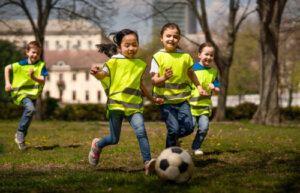7 Outdoor Extracurricular Activities


Reviewed and approved by the pediatrician Marcela Alejandra Caffulli
As a mother, you know that the education of children is very broad. Children need to learn both at home and at school, but also by sharing with friends, playing sports, or doing other useful tasks. That’s why, in this article, we’ll show you some of the outdoor extracurricular activities that your children can be encouraged to practice.
Outside school hours, or on weekends, children and teenagers can learn, be entertained, and have fun. And what better way to do it than in open environments that allow them to enjoy nature, get to know it better, and learn to take care of it? There are a variety of activities that become part of their daily routine and have a great impact on their social and cognitive development.
Learn about outdoor extracurricular activities
Outdoor extracurricular activities are always beneficial for both children and adolescents, as they’ll not only have fun but also enjoy nature and their environment. Let’s take a look at some of the things your children can do outside of school hours!
Play soccer
Soccer is one of children’s favorite sports. In addition, it brings them many benefits, among which teamwork stands out. In this sport, a single player can’t advance without the support and participation of the rest of their teammates. Learn more about the other advantages of playing soccer:
- Improves motor coordination
- Regulates body weight
- Strengthens muscles
- Helps cardiovascular health
- Promotes communication among the group

Practice tennis
Playing tennis is another practice that children and youngsters can do outside of class that helps them develop motor skills and physical coordination skills. Additionally, it improves speed and agility, increases reflexes, and tones and strengthens muscles. Unlike soccer, it’s not a team sport but is played between two opponents, although it’s possible to play in pairs.
Compete in chess tournaments
Going out in the afternoons to compete in chess tournaments will be a very good alternative for both children and teenagers. It’s a strategy game, also recognized as a sport, which contributes to the development of different intellectual capacities. Moreover, it’s suitable for learning at any age. It’s common to see children practicing it in open spaces and testing their concentration and memory.
Take dance classes
Another option for little ones is to develop their body and rhythmic skills through dance, an activity that can also be done outdoors. There are an infinite number of rhythms to choose from, such as flamenco, urban, zumba, ballet, or any other alternative. The most important thing is that they like it, enjoy it, and have fun while learning.
Enter the theater
Those who enjoy acting will love to dabble in theater in their free time. Kids will undoubtedly have a lot of fun inventing, improvising, telling stories, and playing different characters. Theater schools are ideal for helping children develop their verbal and corporal expression and improve their diction.
Learn new languages
One of the outdoor extracurricular activities will be learning new languages. These classes can be taken in outdoor spaces such as parks, which allow a pleasant interaction with nature without the need for distractions. Also, children can get together among friends and review the last language class their teacher gave.
Play a musical instrument
Learning to play a musical instrument is another of the most recommended extracurricular options for children. It’s an activity that can be done both indoors and outdoors. Music helps to increase self-esteem, lift spirits, and build relationships with others.

The benefits of outdoor extracurricular activities
Extracurricular activities are a powerful source of benefits for the healthy development of children. Let’s get to know some of their benefits!
- They improve academic performance. It has been demonstrated that children who do some extracurricular activity show better school results. This is due to a greater motivation to study.
- They stimulate creativity, memory, and concentration.
- They favor communication, as by interacting with other people, the child learns to relate with one another more freely and naturally.
- They create healthy life habits, physically, emotionally, and mentally.
- They develop positive attitudes toward learning. Children feel more willing and committed to their classes outside and inside the school.
- They enhance critical thinking, as the more experiences children have, the greater their ability to analyze and make judgments.
- They provide a sense of well-being. When these outdoor activities are carried out, endorphins and serotonin, the hormones of happiness, are released. As a result, children feel at ease in their tasks.
- A close relationship is established between the child and their environment, as contact with nature is generated. This way, children learn to love and care for nature.
Encourage your children to take part in outdoor extracurricular activities
Children’s activities outside of school are very important for their growth. So, encourage your child to play sports or discover a love of the arts or for furthering their studies. Ask them what they would like to do, but don’t force them to do it. It’s very important that the activity to be performed is to their liking and that the child’s the one who makes the decision. That way, they’ll be more willing to learn.
As a mother, you know that the education of children is very broad. Children need to learn both at home and at school, but also by sharing with friends, playing sports, or doing other useful tasks. That’s why, in this article, we’ll show you some of the outdoor extracurricular activities that your children can be encouraged to practice.
Outside school hours, or on weekends, children and teenagers can learn, be entertained, and have fun. And what better way to do it than in open environments that allow them to enjoy nature, get to know it better, and learn to take care of it? There are a variety of activities that become part of their daily routine and have a great impact on their social and cognitive development.
Learn about outdoor extracurricular activities
Outdoor extracurricular activities are always beneficial for both children and adolescents, as they’ll not only have fun but also enjoy nature and their environment. Let’s take a look at some of the things your children can do outside of school hours!
Play soccer
Soccer is one of children’s favorite sports. In addition, it brings them many benefits, among which teamwork stands out. In this sport, a single player can’t advance without the support and participation of the rest of their teammates. Learn more about the other advantages of playing soccer:
- Improves motor coordination
- Regulates body weight
- Strengthens muscles
- Helps cardiovascular health
- Promotes communication among the group

Practice tennis
Playing tennis is another practice that children and youngsters can do outside of class that helps them develop motor skills and physical coordination skills. Additionally, it improves speed and agility, increases reflexes, and tones and strengthens muscles. Unlike soccer, it’s not a team sport but is played between two opponents, although it’s possible to play in pairs.
Compete in chess tournaments
Going out in the afternoons to compete in chess tournaments will be a very good alternative for both children and teenagers. It’s a strategy game, also recognized as a sport, which contributes to the development of different intellectual capacities. Moreover, it’s suitable for learning at any age. It’s common to see children practicing it in open spaces and testing their concentration and memory.
Take dance classes
Another option for little ones is to develop their body and rhythmic skills through dance, an activity that can also be done outdoors. There are an infinite number of rhythms to choose from, such as flamenco, urban, zumba, ballet, or any other alternative. The most important thing is that they like it, enjoy it, and have fun while learning.
Enter the theater
Those who enjoy acting will love to dabble in theater in their free time. Kids will undoubtedly have a lot of fun inventing, improvising, telling stories, and playing different characters. Theater schools are ideal for helping children develop their verbal and corporal expression and improve their diction.
Learn new languages
One of the outdoor extracurricular activities will be learning new languages. These classes can be taken in outdoor spaces such as parks, which allow a pleasant interaction with nature without the need for distractions. Also, children can get together among friends and review the last language class their teacher gave.
Play a musical instrument
Learning to play a musical instrument is another of the most recommended extracurricular options for children. It’s an activity that can be done both indoors and outdoors. Music helps to increase self-esteem, lift spirits, and build relationships with others.

The benefits of outdoor extracurricular activities
Extracurricular activities are a powerful source of benefits for the healthy development of children. Let’s get to know some of their benefits!
- They improve academic performance. It has been demonstrated that children who do some extracurricular activity show better school results. This is due to a greater motivation to study.
- They stimulate creativity, memory, and concentration.
- They favor communication, as by interacting with other people, the child learns to relate with one another more freely and naturally.
- They create healthy life habits, physically, emotionally, and mentally.
- They develop positive attitudes toward learning. Children feel more willing and committed to their classes outside and inside the school.
- They enhance critical thinking, as the more experiences children have, the greater their ability to analyze and make judgments.
- They provide a sense of well-being. When these outdoor activities are carried out, endorphins and serotonin, the hormones of happiness, are released. As a result, children feel at ease in their tasks.
- A close relationship is established between the child and their environment, as contact with nature is generated. This way, children learn to love and care for nature.
Encourage your children to take part in outdoor extracurricular activities
Children’s activities outside of school are very important for their growth. So, encourage your child to play sports or discover a love of the arts or for furthering their studies. Ask them what they would like to do, but don’t force them to do it. It’s very important that the activity to be performed is to their liking and that the child’s the one who makes the decision. That way, they’ll be more willing to learn.
All cited sources were thoroughly reviewed by our team to ensure their quality, reliability, currency, and validity. The bibliography of this article was considered reliable and of academic or scientific accuracy.
- Molinuevo B. Actividades extraescolares y salud mental, estudio de su relación en población escolar de primaria. España: Universitat Autónoma de Barcelona: 2008. Disponible en: https://dialnet.unirioja.es/servlet/dctes?codigo=90828
- Raza D. Actividades extraescolares y autoeficacia en niños, niñas y adolescentes, el caso de una escuela en Quito, Ecuador. Rev. Abra. 2019; 39 (59): 73-86. Disponible en: https://dialnet.unirioja.es/servlet/articulo?codigo=7430021
- Franco J, Rodríguez I, Martínez M. ¿Qué hacen los estudiantes de educación primaria españoles fuera del horario académico?: actividades extraescolares. Rev. Complutense de Educación. 2022; 33 (3): 459-474. Disponible en: https://redined.educacion.gob.es/xmlui/handle/11162/226504
- Parra A, Antolín L, Oliva A. Los programas extraescolares como recurso para fomentar el desarrollo positivo adolescente. Rev. Papeles del Psicólogo. 2009; 30 (3): 265-275. Disponible en: https://idus.us.es/handle/11441/16945
This text is provided for informational purposes only and does not replace consultation with a professional. If in doubt, consult your specialist.








